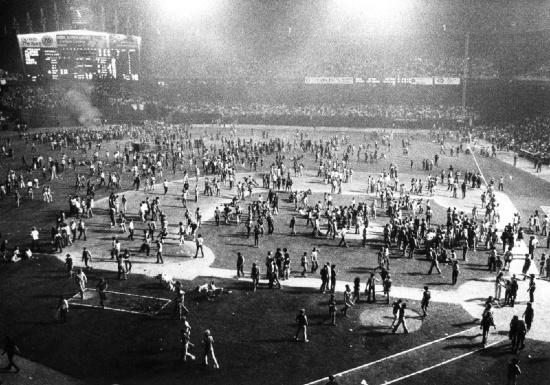Take Me Out to the Mayhem
On July 12, 1979, the Detroit Tigers were in Chicago to play baseball against the White Sox. They were going to play two games — Major League Baseball had scheduled a doubleheader, where fans show up in the mid-afternoon and are treated to two games, the second starting an hour or so after the first. Unfortunately for White Sox fans, the word “treated” was a charitable use of the term. The White Sox weren’t a very good team that year, winning fewer than half their games for the second straight year. Ownership, therefore, wanted to find ways to sell more tickets and keep fans engaged. For the 1979 White Sox, “ownership” was a man named Bill Veeck, known in baseball lore as a showman who pushed the envelope when it came to such promotional efforts. Some promotions were so grandiose, they overshadowed the games themselves.
And in this case, the promotion blew it up. Literally.
The idea is one that, in retrospect, sounds like a really bad one which could cause obvious problems. In 1977, the White Sox held a “Disco Night,” trying to ride on the wave of disco-mania. Disco was popular but, ultimately, divisive, with many anti-fans who not only preferred other genres of music, but specifically singled out disco as the focus of an odd, raging ire. By the summer of 1979, the anti-disco movement in Chicago, comprised mostly of teens led by a radio DJ named Steve Dahl, had even occupied a discotheque in the suburbs, hoping to eradicate the noise being played there. Another anti-disco protest turned into a near-riot — all over otherwise non-controversial music. The whole thing was kind of nuts.
But where most saw danger, Bill Veeck saw opportunity. He and his son Mike, then the promotions director for the White Sox, decided to hold a counter to their Disco Night two years prior. They called it “Disco Demolition Night.” Fans were invited to attend the two games of the July 12th doubleheader at a discounted price — 98 cents (a promotional price referencing Steve Dahl’s employer, radio station WLUP 97.9) and one vinyl disco record. The records were to be collected and, during the intermission between the two games, Dahl was going to blow them up in center field of Comiskey Park, in front of all who attended the games.
Only about 15,000 fans had been attending White Sox games leading up to the doubleheader. Dahl didn’t want the promotion to fall flat, so he talked about it often on his radio show during the days leading up to the event. He did a great job — an estimated 60,000 to 70,000 people, mostly anti-disco teens, showed up to the ballpark. Unfortunately, that was more than the roughly 45,000 that Comiskey Park could accommodate, so the Veecks reassigned security to the gate in an effort to keep latecomers from jumping the turnstiles. This created a noticeable lack of security inside the park in some sections, and as the New York Times reported, gave baseball-ambivalent anti-disco-ers an opportunity to cause all sorts of chaos. The Times quoted Tigers pitcher Jack Morris, who claimed that “whiskey bottles were flying over the dugout.” Outfielder Rusty Staub said that he suggested fielders wear batting helmets because of all the flying objects — mostly records, but also some glass as well. Somehow, though, the two teams competed the first game, and at 8:40 that evening, Dahl made it onto the field. After riling up the crowd a little more, as he was supposed to do, he blew the records to kingdom come.
And then all you-know-what broke loose.

Disco-haters stormed the field, lighting records on fire, tearing up the outfield grass (which already had a sizable hole in it due to the Dahl-driven explosion moments earlier), climbing the walls and foul poles, stealing bases and bats, and, as a coup de grace, starting a bonfire in the outfield. A few minutes after 9 P.M., Chicago police showed up in riot gear to disperse the crowd, and the handful of disco-agnostic baseball fans in the crowd cheered. (Many tried to leave prior to this, but to prevent gate jumpers, security had locked all but one gate — and, in doing so, had unintentionally prohibited many of the fans from leaving.) The 5,000 to 10,000 rioters cleared out rather quickly, with only a few dozen arrested.
Unfortunately for the remaining fans, though, these die-hards would not be able to watch their beloved White Sox lose. The White Sox lost — that’s for sure — but did so in perhaps the least enjoyable way possible. There was no second game that evening. Even after an hour of cleanup, the umpires ruled that the field conditions were too dangerous to allow players to take the field, and the White Sox were forced to forfeit the second game. The only thing that suffered a worse defeat? Disco. On July 21, 1979, only a week or so after the disaster in Chicago, six of the top 10 songs in the U.S. were disco tracks. By September 22 of that year, there were none.
Bonus Fact: On October 1, 1977, a disco track topped the Billboard Hot 100 and remained there for two weeks. That song? “Star Wars Theme/Cantina Band,” a disco-instrumental mashup of two songs from Star Wars. (Really. You can listen to it and watch the super-weird video here.) According to Wikipedia, it’s “the best-selling instrumental single in recorded history,” disco or otherwise.
From the Archives: Reading Them the Riot Act: The origins of that phrase.
Related: The complete Star Wars-inspired disco CD. Not to be burned at White Sox games.
